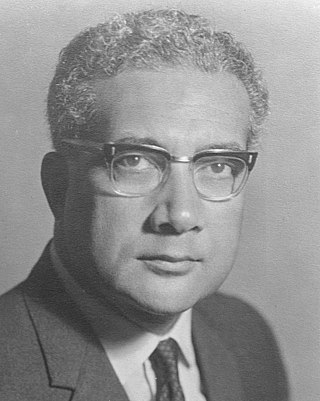
RatuSir Kamisese Mara,was a Fijian politician,who served as Chief Minister from 1967 to 1970,when Fiji gained its independence from the United Kingdom,and,apart from one brief interruption in 1987,the first Prime Minister from 1970 to 1992. He subsequently served as president from 1993 to 2000.

Articles about people,places,things,and concepts related to or originating from Fiji,include:

RatuSeru Epenisa Cakobau was a Fijian chief,monarch,and warlord (Vunivalu) who united part of Fiji's warring tribes under his leadership,establishing a united Fijian kingdom. He was born on Natauloa,Nairai Island in Lomaiviti but spent his youth on Vanuaso,Gau,Lomaiviti,later returning to Bau to re-establish his Father's Ratu Tanoa Visawaqa reign. Ratu Epenisa Seru Visawaqa was given the name "Cakobau" meaning destroyer of Bau,in reference to his grandfathers' (Nailatikau) effort to first claim the tile from the people of Butoni and Lovoni,returned with most of his warriors from Vanuaso,Gau,Lomaiviti to coup the leadership in Bau then and later takeover his father's title;known after his father as the 6th "Vunivalu" or Warlord of Bau.
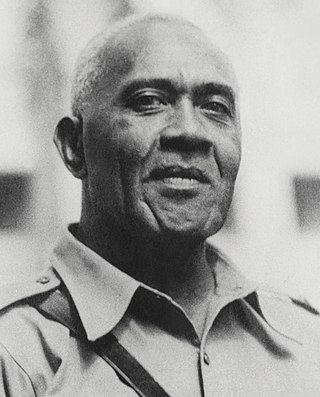
RatuSir Josefa Lalabalavu Vanayaliyali Sukuna was a Fijian chief,scholar,soldier,and statesman. He is regarded as the forerunner of the post-independence leadership of Fiji. He did more than anybody to lay the groundwork for self-government by fostering the development of modern institutions in Fiji,and although he died a dozen years before independence from the United Kingdom was achieved in 1970,his vision set the course that Fiji was to follow in the years to come.

RoLala,Lady Mara,maiden name Litia Cakobau Lalabalavu Katoafutoga Tuisawau was a Fijian chief,who was better known as the widow of Ratu Sir Kamisese Mara,modern Fiji's founding father who served for many years as Prime Minister and President of his country. As Fiji's First Lady,Adi Lala took on a diplomatic role,frequently representing her country abroad. She was regarded as a formidable and astute woman,whose influence on her husband was said to be considerable.
Ratu is an Austronesian title used by male Fijians of chiefly rank. An equivalent title,adi,is used by females of chiefly rank. In the Malay language,the title ratu is also the traditional honorific title to refer to the ruling king or queen in Javanese culture. Thus in Java,a royal palace is called "keraton",constructed from the circumfix ke- -an and Ratu,to describe the residence of the ratu.
RatuJoni Madraiwiwi,Lord Madraiwiwi Tangatatonga was a prominent Fijian lawyer,legal scholar,jurist,and politician. He served as vice-president,and also acting president,of Fiji,and Chief Justice of Nauru.
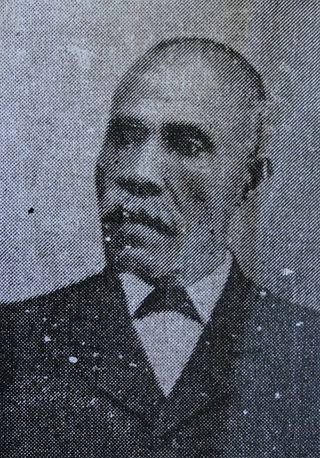
RatuJoni Madraiwiwi was a Fijian Ratu and early colonial administrator in what was then the British Crown Colony of Fiji.

Turaga na Vunivalu na Tui Kaba,shortened as Vunivalu,is the Paramount Chief of the Kubuna Confederacy of the island of Bau in Fiji. Loosely translated the title means Warlord of Bau or "Root of War". The succession to the title does not follow primogeniture,but the candidate must be a high-ranking member of the Tui Kaba clan.
Adi is a title used by Fijian women of chiefly rank,namely female members of chiefly clans. It is the equivalent of the Ratu title used by male chiefs. It is in general use throughout most of Fiji,although on Kadavu Island,Bulou is used instead.
RatuAlifereti Finau was the eleventh Sau ni Vanua of Lau and the fifth Tui Nayau. He was a member of the noble household Matailakeba.
AdiLitiana Maopa (1864-1933) was a prominent member of two of Fiji's main chiefly houses,those of the Tui Nayau,the paramount chief of the Lau Islands,and the chiefly house of the Vunivalu of Bau the paramount chief of the Kubuna Confederacy.
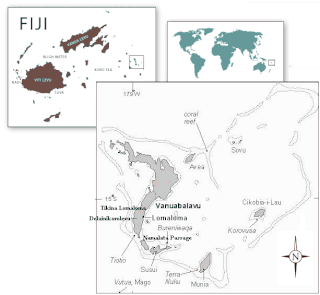
Turaga na Rasau is a traditional Fijian chiefly title of the Lau Islands. Prior to Fiji's colonial days,Fiji had many different Vanua with their own Paramount Chieftain which exercised no authority over the other;a saying from the island of Kadavu aptly summarises it "Nomu Turaga o sega na noqu Turaga" or "Your Chief is not my Chief" also the people of Beqa Island were of a similar opinion saying "Qali Cuva Ki Lagi" or "Subject only to heaven" and would bow to no outside Chieftain,but at the turn of the 20th century aspects of the traditional social structure remained,but for administrative purposes three main Matanitu were solidified and formed as they were the dominant consolidated powers at the time being that of Kubuna,Burebasaga and Tovata. With regard to the Rasau while its traditional origins were in Kubuna on Bau the titles traditional authority in modern Fiji is now in Tovata,Lau in particular Lomaloma Tikina on the Island of Vanua Balavu.
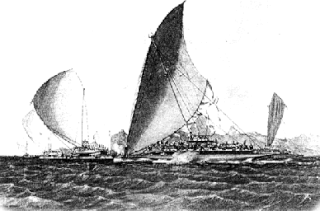
The Lasakau Sea Warriors were a 19th-century warrior sub-culture in the pre-colonial state of Bau,in Fiji. The sea warriors were instrumental in spreading Bau's political power throughout the South Pacific archipelagic islands. The rise of the eminent islet of Bau amongst other embryonic states was due mainly to the projection of sea power through its naval forces. Bauan chief Ratu Loaloadravu Tubuanakoro was praised by French Captain Dumont D'Urville in May 1827 for his geographic knowledge of the Fijian archipelago signifying Bau's naval influence. More far-ranging than Bau's land warriors led by the Vusaradave clan,the Lasakau clan became the leading proponents of war and tribute for the emerging island kingdom. They became known as the Bai kei Bau or 'War fence of Bau'. Sahlins made the crucial observation that," The kings of Bau based their rule not on native cultivators but on native sailors and fishers-which is to say in Fijian categories,as in political strategies,not on the land but on the sea". This was the great political transformation that catapulted Bau to power over other pre-colonial kingdoms.
Lady Liku was a woman of chiefly title in the Fiji Islands and was the wife of the late Ratu Sir Lala Sukuna.
Kapaiwai Tuimacilai Mara,chiefly seafarer,and descendant of the Vunivalu of Bau.
Bau is the main village on Bau Island,Fiji. Once integral to the power and economy of the chiefly village,the villages of Lasakau and Soso are also located on the twenty-two acre island which became the centre of traditional power throughout the Fiji Islands in the nineteenth century.
RatuJione Atonio Rabici "Tom" Doviverata was a Bau chief and medical doctor and administrator in colonial Fiji.
RatuTiale Wimbledon Thomas Vuiyasawa was a Fijian chief,civil servant and politician. He served as a member of the Legislative Council and Senate.
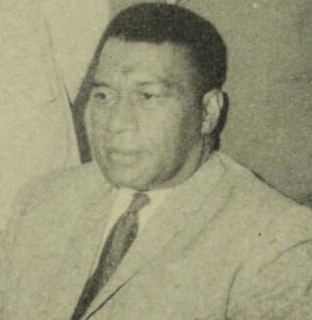
RatuNapolioni Naulia Dawai was a Fijian chief and politician. He served as a member of the Senate and House of Representatives from 1970 to 1986.










